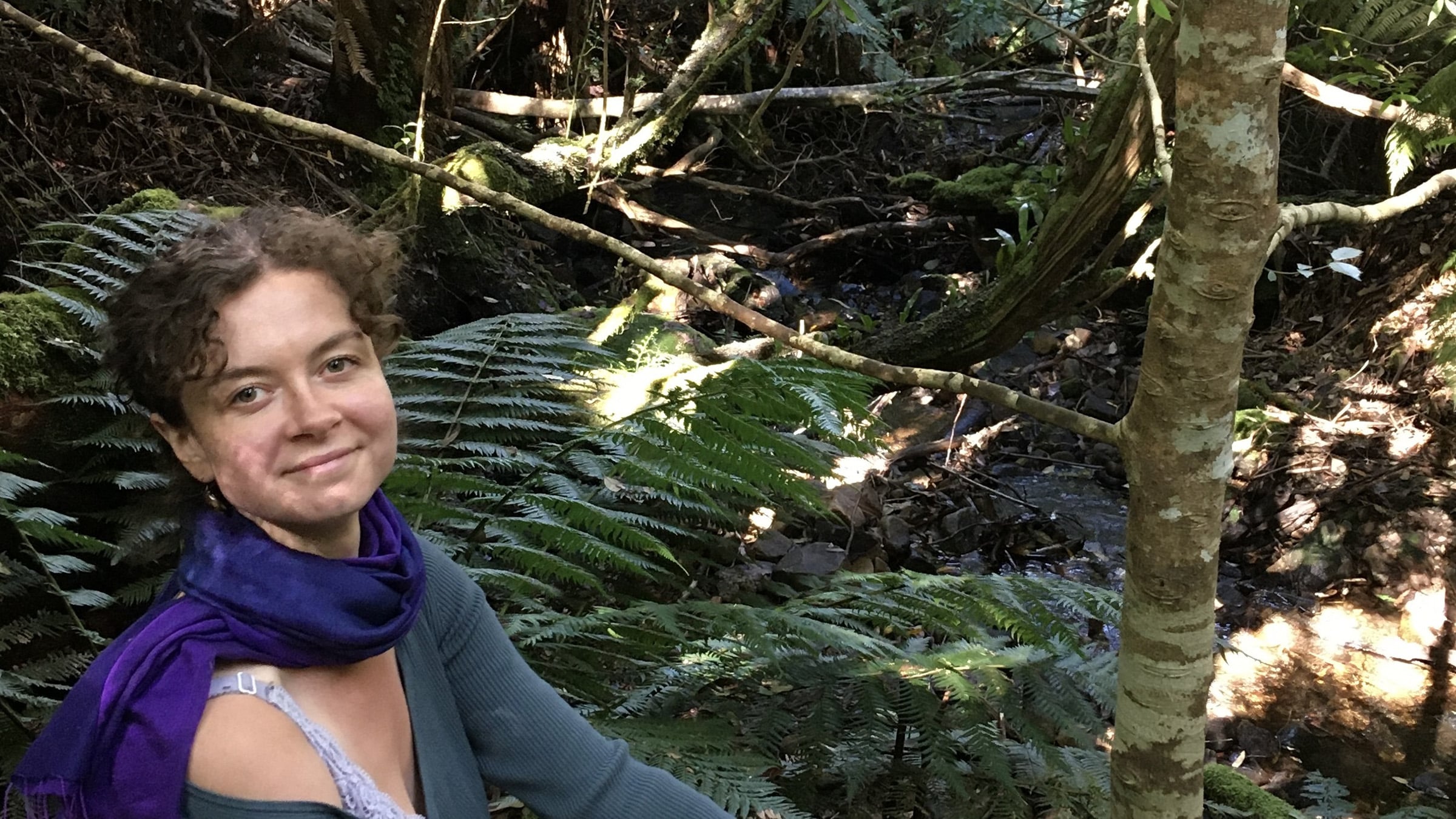Amina McCauley experienced climate change in the ancient forests of Tasmania. Now she wants students around the globe to understand its effects.

Amina McCauley sits among the fern trees in Wellington Park, Tasmania. (Photo courtesy Amina McCauley)
Concern about climate change didn’t come to Amina McCauley as an epiphany.
Growing up in the Australian bush on the side of Mount Wellington, McCauley was raised just in Tasmania, the southernmost point of Australia.
The island state has more than 1.5 million hectares of wilderness and forest. It is also home to Huon pines more than 2,000 years old, which are some of the oldest trees on Earth.
“So I feel like climate change never really suddenly came up,” McCauley said. “I felt like I’ve always been interested in protecting the environment.”
But now, climate change is central to what McCauley is doing at News Decoder as she heads its EYES project — Empowering Youth through Environmental Storytelling.
Teaching climate change in classrooms
In EYES, McCauley will help create material for climate education with the goal of creating accessible learning tools for teachers across schools from Europe to Africa.
Funded by Erasmus+, EYES is a sequel to News Decoder’s previous project, The Writing’s on the Wall, or WoW. EYES is again partnering with the Climate Academy in Belgium and Superfluous, a Netherlands-based youth empowerment organization.
“We’re really excited about this because it takes what was a small pilot project to try out some ideas, and gives us two full years to develop it into a full curriculum that merges the Climate Academy’s climate science expertise and News Decoder’s journalism expertise,” said Maria Krasinski, managing director of News Decoder.
McCauley will combine the work of News Decoder, the Climate Academy and Superfluous to create youth journalism resources, including stories, podcasts and videos centered around climate change.
“I think what struck me was the importance that was being placed on education — between journalism education and climate change,” McCauley said. “I was already struck by this sort of connection, and having the Climate Academy working together with News Decoder. It feels like a really wonderful and important combination to have in schools.”
Giving teachers the tools they need
Crucial to EYES is its development of educational material that can be disseminated throughout international school systems.
For McCauley, the environment and journalism have already intertwined in the teaching field. She has led webinars on environmental communication at the University of Tasmania.
“When we were looking for a program manager for this role, we definitely knew we wanted someone who could bring the journalist perspective but also have an understanding of education and translating journalistic skills and principles into the classroom, all under the umbrella of climate change,” Krasinski said.
McCauley had the trifecta of skills in experience, Krasinski said. “From the moment we met her, we felt she had a great demeanor for someone who would be working and collaborating not just with our partners, but with our partner schools and students in the programs,” Krasinski said.
McCauley has also previously worked at NewsGuard, an organization that rates the trustworthiness of news, as a media analyst monitoring misinformation. She finds a crucial link between news readers and news writers.
A winding road to News Decoder
At university, McCauley intended to go into law but she found a different calling. “Within the first semester of law I realized that I didn’t want to be a lawyer,” McCauley said. “Instead, I wanted to explain all of these really important theories, concepts to the greater public.”
She found the opportunity to do so through a Facebook post about the EYES project.
“I’d really never read a job description before and felt like, ‘Oh my gosh, this is me,'” McCauley said. “This is bringing together all my interests, all my background.”
It is the potential of the EYES project that excites her.
“The reason I think why I am also really drawn to the project is that I feel like a small player, personally, but I see the power in numbers,” McCauley said. “And so I feel like my place is to do what I can to help this project flower, and share this collaboration and skills, so that the number of people with these skills grows and grows and grows.”
Journalism and environmental literacy
McCauley’s first direct combination between journalism and the environment was forged in her undergraduate years of college, in a thesis on the media coverage of deforestation in Tasmania.
In Tasmania, which is home to the United Tasmania Group — the first Green party in the world — McCauley noticed a decrease in press when a decrease in forested areas also occurred.
“Tasmania is a really amazing anecdote for the kinds of fights that are being fought across the world, it’s just on such a small scale — but it feels so big to a Tasmanian, and it feels so big even to Tasmania,” McCauley said.
Connecting this project to a global scale, McCauley became interested in the analytical side of journalism and media literacy.
Krasinski said this thesis stuck out as an example of the EYES program’s goals for the classroom.
“It’s a big facet of this project in critiquing what the narratives around climate change are and how we can equip students and teachers to be more media literate when it comes to climate stories, both consuming and producing them,” Krasinski said.
Any work in McCauley’s life — from being a yoga teacher to writing stories about the European Union’s ties to the Yemen War for the EU Observer or the struggling tourism industry in Bali for the Southeast Asia Globe — has centered around the cross border connections journalism experiences have fostered.
She has studied in the Netherlands, Czech Republic and Denmark, earning a Master’s degree in journalism with the Erasmus Mundus program.
“I feel as if knowing people from all over the world, in such incredibly different contexts than what Australia is, has given me a much different world view and a much different view on life and culture and how to live, than I had 10 years ago,” McCauley said. “I feel as if it’s affected every part of my life, my writing, my interests, what I want to do with my career.”
Without missing a beat, McCauley nodded. “It’s the reason I’m here at News Decoder.”

Kaja Andrić joined the News Decoder team as an intern in January 2024. She is a second-year Journalism student at New York University. She is also studying Romance Languages with a concentration in French and Italian. Andrić has written for both NYU’s Washington Square News and Cooper Squared publications. Previously, she was a correspondent for the Florida Weekly newspaper’s Palm Beach community chapter. In 2022, she was Florida Scholastic Press Association’s Writer of the Year.
Interested in News Decoder’s projects? Read more stories here:
